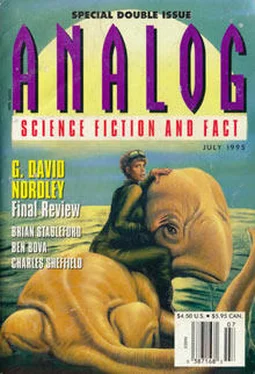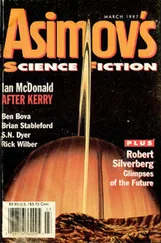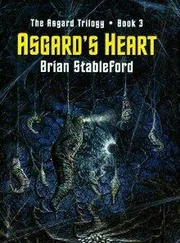Brian Stableford - Inherit the Earth
Здесь есть возможность читать онлайн «Brian Stableford - Inherit the Earth» весь текст электронной книги совершенно бесплатно (целиком полную версию без сокращений). В некоторых случаях можно слушать аудио, скачать через торрент в формате fb2 и присутствует краткое содержание. Год выпуска: 1995, Издательство: Dell Magazines, Жанр: Фантастика и фэнтези, на английском языке. Описание произведения, (предисловие) а так же отзывы посетителей доступны на портале библиотеки ЛибКат.
- Название:Inherit the Earth
- Автор:
- Издательство:Dell Magazines
- Жанр:
- Год:1995
- ISBN:нет данных
- Рейтинг книги:5 / 5. Голосов: 1
-
Избранное:Добавить в избранное
- Отзывы:
-
Ваша оценка:
- 100
- 1
- 2
- 3
- 4
- 5
Inherit the Earth: краткое содержание, описание и аннотация
Предлагаем к чтению аннотацию, описание, краткое содержание или предисловие (зависит от того, что написал сам автор книги «Inherit the Earth»). Если вы не нашли необходимую информацию о книге — напишите в комментариях, мы постараемся отыскать её.
Inherit the Earth — читать онлайн бесплатно полную книгу (весь текст) целиком
Ниже представлен текст книги, разбитый по страницам. Система сохранения места последней прочитанной страницы, позволяет с удобством читать онлайн бесплатно книгу «Inherit the Earth», без необходимости каждый раз заново искать на чём Вы остановились. Поставьте закладку, и сможете в любой момент перейти на страницу, на которой закончили чтение.
Интервал:
Закладка:
When Singh touched the console beneath the screen the flashing words were replaced by an image of a man sitting on a perfectly ordinary chair. Damon recognised Silas Arnett. He was not under any obvious restraint, but there was a curious expression in his eyes, and both of his hands were heavily bandaged. He began speaking in a flat monotone.
Damon knew immediately that the image and the voice were both fakes, derived from the kind of template he used routinely in his work.
“The situation was out of hand,” the false Arnett said, dully. “All attempts to limit environmental spoliation by legislation had failed, and all hope that the population would stabilize or begin to decline as a result of individual choice was gone. We were still winning the battle to provide enough food for everyone, even though the distribution system left seven or eight billions lacking, but we couldn’t cope with the sheer physical presence of so many people in the world. Internal technology was developing so rapidly that it was obvious to anyone with half a brain that off-the-shelf emortality was less than a lifetime away, and that it would revolutionize the economics of medicine. Wars over lebensraum were being fought on every continent, with all kinds of weapons, including real plagues: killing plagues.
“When Conrad first put it to us that what the world needed more desperately than anything else was a full stop to reproduction—an end to the whole question of individual choice in matters of fecundity—nobody said ‘No! That’s horrible!’ We all said ‘Yes, of course—but can it be done?’ When Conrad said ‘There’s always a way,’ no one challenged him on the grounds of propriety. I couldn’t see how we might go about designing a plague of sterility, because there were no appropriate models in nature—how could there be, when the logic of natural selection demands fertility and fecundity?—and I couldn’t envisage a plausible physiology, let alone a plausible biochemistry, but Conrad’s way of thinking was quite different from mine. Even in those days, all but a few of the genes we claimed to have ‘manufactured’ were actually the chance products of mutation of extant genes—we had little or no idea how to go about creating genes from scratch to have entirely novel effects—but Conrad had a weird kind of genius for that kind of thing. He knew that he could figure out a way.
“I wonder, sometimes, how may other groups must have had conversations very like ours. ‘Wouldn’t it be great if we could design a virus that would sterilize almost everyone on Earth?’... ‘Yes, wouldn’t it—what a shame there’s no place to start.’ Was there anywhere in the world in the 2070s where bioengineers gathered where such conversations didn’t take place? Maybe some of the others took it further; maybe they even followed the same thread of possibility that Conrad pointed out to us. Maybe Conrad wasn’t the only one who could have done it, merely the one who hit the target first. I don’t know—but I do know that if you’d put that kind of loaded pistol into the hand of any bioengineer of the period the overwhelming probability is that the trigger would have been squeezed.
“We didn’t discriminate: we set out to sterilise everybody. Everybody in the world. And we succeeded. That’s what saved the world; if the population had continued to increase and nanotech emortality had spread like wildfire through a world which was still vomiting babies from billions of wombs, nothing could have restrained the negative Malthusian checks. Famine, war and killing plagues would have run riot. As things were, famine was held at bay, the wars cooled off and the killing plagues were countered one by one. What happened in the last three decades of the twenty-first century wasn’t a tragedy at all—but the fact that it was seen as a tragedy, and a terrible threat to the future of the species, increased its beneficial effects. The Great Plague was a common enemy, and it created such a sense of common cause, focused on the development of artificial wombs and the securing of adequate supplies of sperms and ova, that for the first time in history the members of the human race were all on the same side.
“We’re still living on the legacy of that break in history, in spite of attempts made by madmen like the Eliminators to set us all at one another’s throats again. We’re still all on the same side, all engaged in the same ongoing quest—and Conrad Helier did that. You have no conception of the debt which the world owes to that man.”
“You don’t regret what you did, then?” asked a whispery voice from offstage.
“No,” said Arnett’s simulacrum, dispiritedly. “If you’re looking for some sign of repentance, forget it. What we did was necessary, and right. ”
“And yet you’ve kept it secret all these years. When you were first accused of having done this, you denied it. When you realised that further denial was useless, you attempted to take sole responsibility—not out of pride, but out of a desire to protect your collaborators. The truth had, in the end, to be extracted from you. Why is that, if you aren’t ashamed of what you did?”
“Because there are people in the world like you. Because the world is overly full of people whose moral horizons are narrow and bleak. For every man who would have understood our reasons, there would have been half a hundred who would have said How dare you do this to me? How dare you take away my freedom of self-determination, even for the good of the world?’ Too many people would have seen sterilization as a theft, as a loss of power. Many young people, bom into a world of artificial wombs, find it faintly repulsive that women ever had to give birth, but too many members of the older generations still feel that they were robbed, changed without their consent. Karol Kachellek and Eveline Hywood are still doing important work; they never wanted to be sidetracked by the kind of publicity the revelations which you’ve forced out of me would generate— will generate, I suppose.”
“What right did you have to make decisions for all mankind?” the second synthetic voice asked, still maintaining its stage-whisper tone. “What right did you have to play God?”
“What gave us the right,” Arnett’s image replied, the voice as relentlessly dull as it had been throughout, “was our understanding. Conrad had the vision, and the artistry required to develop the means. The responsibility fell to him—you might as well ask what right he had to surrender it to others, given that those others were mostly ill-educated egomaniacs whose principal short-term aim was to slaughter their neighbours. Someone had to be prepared to take control, or the world was doomed. When you know that people won’t accept the gift of their own salvation, you have only two choices: to force it on them, or leave them to destruction. It was better for the world to be saved—and it was better for the world to believe that it had been saved by a fortunate combination of miracles rather than by means of a conspiracy. Conrad always wanted to do what was best for the world, and keeping our actions secret was simply a continuation of that policy.”
“What of the unhappiness caused by the frustration of maternal instinct?” asked the interrogative voice, in a voice devoid of any real indignation. “What of the misery generated by the brutal wrench which you administered to human nature? There are many—and not merely those who survived the Crash—who would argue that ours is now a perverted society, and that the reckless fascination with violence which is increasingly manifest in younger generations is a result of the perversion of human nature occasioned by universal sterilization.”
Читать дальшеИнтервал:
Закладка:
Похожие книги на «Inherit the Earth»
Представляем Вашему вниманию похожие книги на «Inherit the Earth» списком для выбора. Мы отобрали схожую по названию и смыслу литературу в надежде предоставить читателям больше вариантов отыскать новые, интересные, ещё непрочитанные произведения.
Обсуждение, отзывы о книге «Inherit the Earth» и просто собственные мнения читателей. Оставьте ваши комментарии, напишите, что Вы думаете о произведении, его смысле или главных героях. Укажите что конкретно понравилось, а что нет, и почему Вы так считаете.


![Лаура Бренз - Потомственная ведьма[Inherit the Witch]](/books/79609/laura-brenz-potomstvennaya-vedma-inherit-the-witch-thumb.webp)









